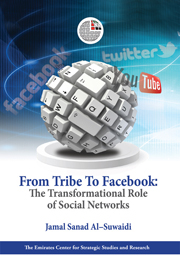Book contents
- Frontmatter
- Contents
- Acknowledgments
- Introduction
- Keywords
- Scope of the Study
- Previous Studies
- Social Networks: Concept and Role
- Statistical Indicators of Main Social Networks
- The Social Networking Age
- Data-entry Potential of Social Networks
- Impact of Social Networks
- Prospects for the Relationship between Traditional Media and Social Networks
- Legal Problems Associated with the Use of Social Networks
- Social Networks: Future Prospects
- Conclusion: Various Future Prospects
- Notes
- Bibliography
- Index
The Social Networking Age
Published online by Cambridge University Press: 05 September 2014
- Frontmatter
- Contents
- Acknowledgments
- Introduction
- Keywords
- Scope of the Study
- Previous Studies
- Social Networks: Concept and Role
- Statistical Indicators of Main Social Networks
- The Social Networking Age
- Data-entry Potential of Social Networks
- Impact of Social Networks
- Prospects for the Relationship between Traditional Media and Social Networks
- Legal Problems Associated with the Use of Social Networks
- Social Networks: Future Prospects
- Conclusion: Various Future Prospects
- Notes
- Bibliography
- Index
Summary
The current social networking age is characterized by a ‘sense of personal subjectivity,’ and the individual's ability to make an impact in an open world through a low-cost and widespread means of expression. Furthermore, this age is ‘infinitely’ diverse in terms of media messages and their content; able to violate copyrights and intellectual property rights; allows crimes to be committed remotely; raises the complexity of electronic security systems; and encourages cross-border communication. The individual is in touch with the outside world without leaving his personal space, and “when the ‘distances disappear,’ then ‘ideas have wings,’” and it becomes easier to share opinions with others, which influences individual and collective behavior. The features and attributes that characterize the age of electronic social networking contribute directly and indirectly to societal developments in several areas:
There is direct correlation between the individual, personal freedom, and social networks; the more the individual's need for freedom, the more the need to use social networks. In the other direction, the more the freedom to use social networks increases, the more the number of their users increases, and the more social networks become essential to an individual's life as a window to the world. As such, we find in Western countries that an individual's usage of social networks is increasing more than in China for example.
Political awareness has increased among citizens at an unprecedented rate. Communication between social network site users provides an opportunity for discussion and greater understanding of political issues and topics raised, especially in the light of the fact that users include intellectuals, politicians, academics and ordinary members of the public.
- Type
- Chapter
- Information
- From Tribe to FacebookThe Transformational Role of Social Media, pp. 36 - 44Publisher: Emirates Center for Strategic Studies and ResearchPrint publication year: 2013



